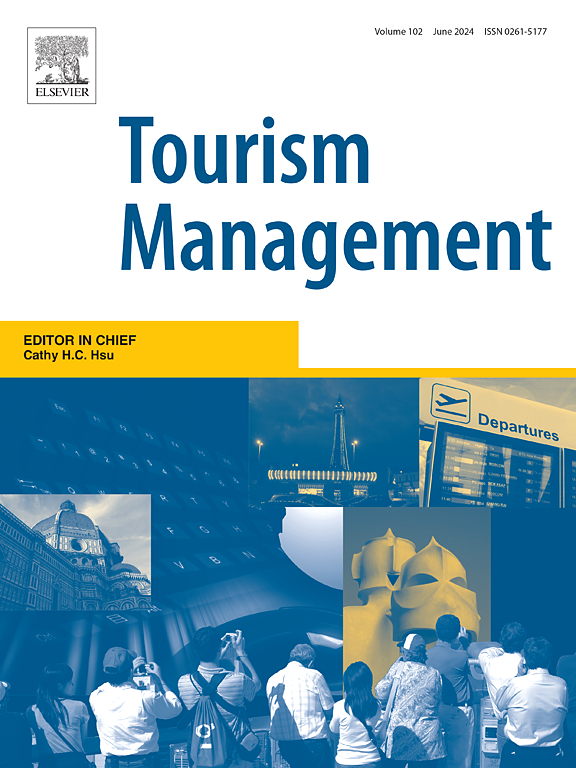Enhancing pro-environmental behavior in tourism: Integrating attitudinal factors and Norm Activation Theory
IF 10.9
1区 管理学
Q1 ENVIRONMENTAL STUDIES
引用次数: 0
Abstract
This research utilizes the Norm Activation Theory to explore tourists' pro-environmental behavior. The study has two parts: the first qualitatively explores constructs predicting visitors' pro-environmental behavior, while the second quantitatively measures pro-environmental behaviors and individual attitudes through a survey. Since augmented reality (AR) is transforming sustainable tourism by offering interactive educational experiences, during EXPO 2020 in Dubai, 1506 participants who engaged with AR were surveyed electronically from October 2021 to May 2022. Partial least squares structural equation modeling (PLS-SEM) was used to test hypotheses. The results suggest that tourists' environmental values and sensitivity enhance their responsibility aspirations, with awareness of tourism's negative environment and mitigation knowledge moderating the effects of responsibility aspirations on personal norms and pro-environmental behavior, respectively, while personal norms mediate the relationship between responsibility aspirations and pro-environmental behavior. These insights are valuable for tourism stakeholders, policymakers, and organizations aiming to promote environmental sustainability in the industry.
旅游环境行为的提升:态度因素与规范激活理论的整合
本研究运用规范激活理论探讨游客的亲环境行为。本研究分为两部分:第一部分对游客亲环境行为的预测结构进行定性探索,第二部分通过问卷调查对游客亲环境行为和个人态度进行定量测量。由于增强现实(AR)正在通过提供互动教育体验来改变可持续旅游业,因此在2020年迪拜世博会期间,从2021年10月到2022年5月,对1506名参与AR的参与者进行了电子调查。采用偏最小二乘结构方程模型(PLS-SEM)对假设进行检验。结果表明,旅游者的环境价值观和环境敏感性增强了旅游者的责任愿望,旅游负面环境意识和缓解知识分别调节了责任愿望对个人规范和亲环境行为的影响,而个人规范则调节了责任愿望和亲环境行为之间的关系。这些见解对旅游业利益相关者、政策制定者和旨在促进旅游业环境可持续性的组织都很有价值。
本文章由计算机程序翻译,如有差异,请以英文原文为准。
求助全文
约1分钟内获得全文
求助全文
来源期刊

Tourism Management
Multiple-
CiteScore
24.10
自引率
7.90%
发文量
190
审稿时长
45 days
期刊介绍:
Tourism Management, the preeminent scholarly journal, concentrates on the comprehensive management aspects, encompassing planning and policy, within the realm of travel and tourism. Adopting an interdisciplinary perspective, the journal delves into international, national, and regional tourism, addressing various management challenges. Its content mirrors this integrative approach, featuring primary research articles, progress in tourism research, case studies, research notes, discussions on current issues, and book reviews. Emphasizing scholarly rigor, all published papers are expected to contribute to theoretical and/or methodological advancements while offering specific insights relevant to tourism management and policy.
 求助内容:
求助内容: 应助结果提醒方式:
应助结果提醒方式:


